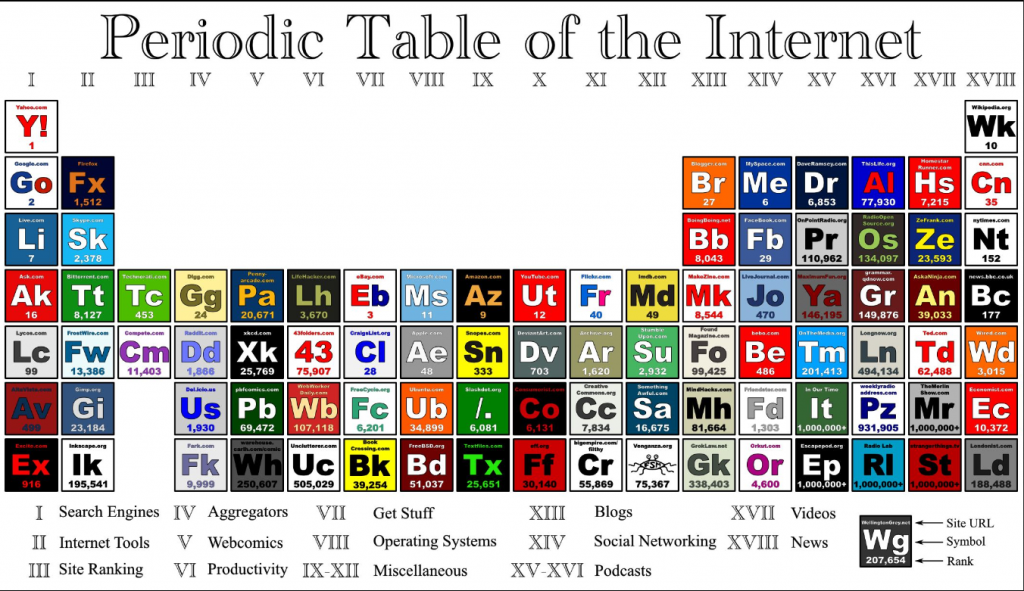 Boris, a Chemistry 11 teacher, might be interested in a website called, “Quizlet”. Quizlet is an online flashcard-generating-tool “created by high school sophomore Andrew Sutherland in Albany, California… As of January 2014, Quizlet ha[d] over 35 million user-generated flashcard sets and more than 11 million registered users.” (Wikipedia, 2007).
Boris, a Chemistry 11 teacher, might be interested in a website called, “Quizlet”. Quizlet is an online flashcard-generating-tool “created by high school sophomore Andrew Sutherland in Albany, California… As of January 2014, Quizlet ha[d] over 35 million user-generated flashcard sets and more than 11 million registered users.” (Wikipedia, 2007).
Quizlet even has several sets of cards for students wishing to memorize facts about the Periodic table, such as this set. The flash cards can be used in a multitude of ways. You can view questions and then guess the answers, or you can view the answers and try to think of the guiding question. You can set it to scroll through at a timed pace, set the cards to play randomly or in order, and/or manually click each card to your own pace. You can even have the website read the text on the card out loud for you. After testing your skills with the flash cards, there ,are tests designed based on the card questions which give you feedback of how you are doing, such as this one, again on the Periodic Table.
If unfamiliar with Quizlet (as I am), Boris may choose to challenge his students to create their own set of flashcards, or perhaps divide up his class into subgroups to have students create groups of flashcards. For example, each group could focus on a single family of elements (a single column on the Periodic Table). By dividing the students into groups, and challenging them to create specific sets of cards, the students will be actively engaged in constructing their own reflective learning, and it won’t seem as such a monumental task as creating flashcards for the entire Periodic Table. This exercise would help meet many conditions outlined by Gibbs and Simpson (2004) as being critical to assessment, specifically:
- Assessed tasks should provide students with enough time to learn the material. By creating flashcards, students will be revisiting knowledge learned in Boris’ class and reinforcing that new knowledge in new ways.
- Engaging students in a productive activity related to learning. Allowing students to take ownership for their learning as a collective may prove beneficial both to the individual, and to the group. In the words of Terry Anderson (2008), “…the group itself is an educational resource with characteristics that are different than the bounded interaction among two or more learners registered in a course.”
In the end, Boris and his students will have created one, large, comprehensive set of cards to cover a vast amount of material. The generation of the cards themselves could even be assessed by Boris to see the thoroughness / complexity of each groups’ work. The design of assessment and the feedback Boris would provide to each group would be essential to the learning of each individual within that group. According to Gibbs and Simpson (2008), his feedback needs to be: detailed, focused on their performance as members of a group, focused on their learning, timely, appropriate to the task at hand (ie. the criteria is crystal clear and allows students to develop deep understanding of concepts), and also attended to by the student (ie. the student will use the feedback to further improve upon and strengthen knowledge of concepts).
One challenge within this scenario could be access to this online resource. Some students may have limited or no access to the internet, especially if living on the outskirts of their town in the Bulkley Valley. However, because Boris “uses his school district’s Moodle server to disseminate lecture notes, lab forms and to answer student questions outside of class time via a discussion forum”, I will assume that most if not all of his students do have access to the internet in some capacity.
Just as an aside, and because I find the Periodic Table to be pretty cool (fully admitting that I am a Chemistry nerd here), you should check out this Periodic Table online. It’s interactivity and layers of knowledge is pretty staggering!
1(2007). Quizlet – Wikipedia, the free encyclopedia. Retrieved March 2, 2014, from http://en.wikipedia.org/wiki/Quizlet.
Anderson, T. (2008). Towards a theory of online learning. Theory and practice of online learning, 45-74.
Gibbs, G., & Simpson, C. (2004). Conditions under which assessment supports students’ learning. Learning and teaching in higher education, 1(1), 3-31.
